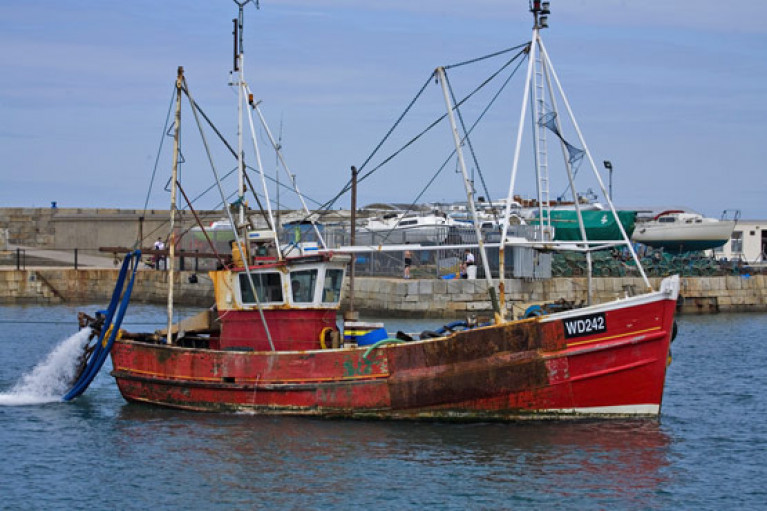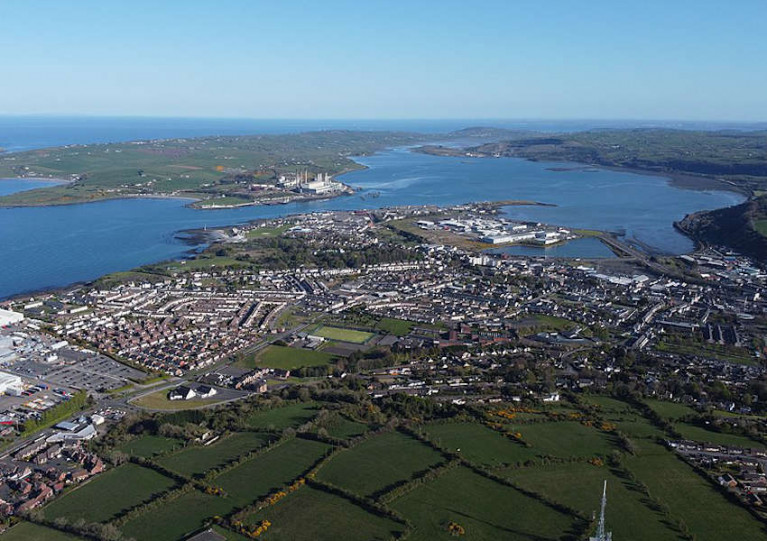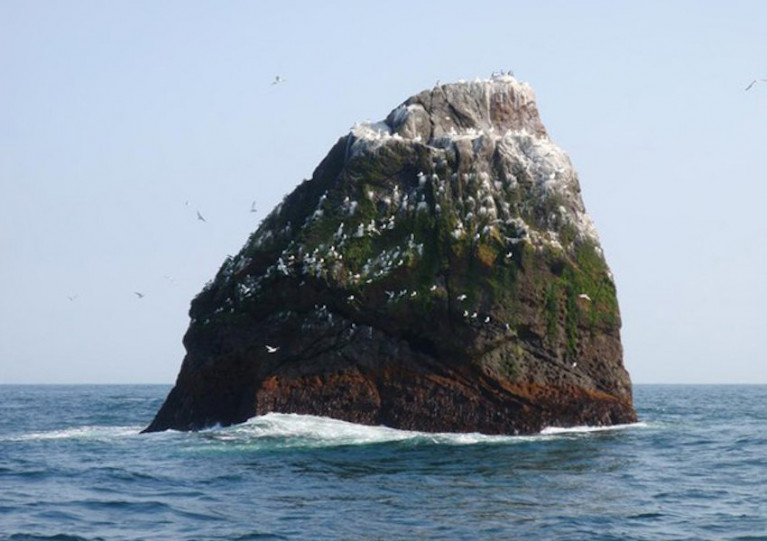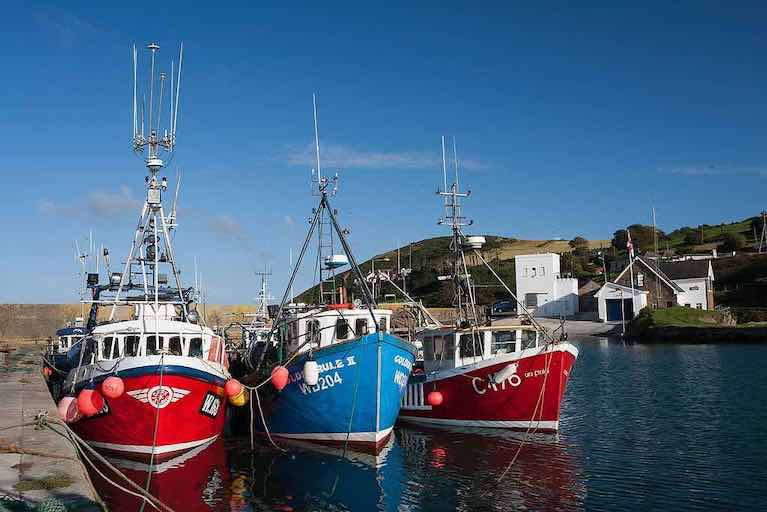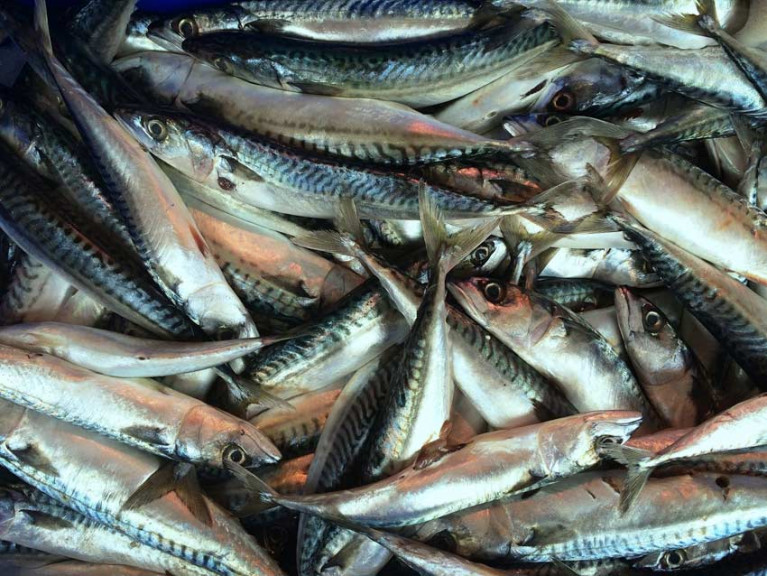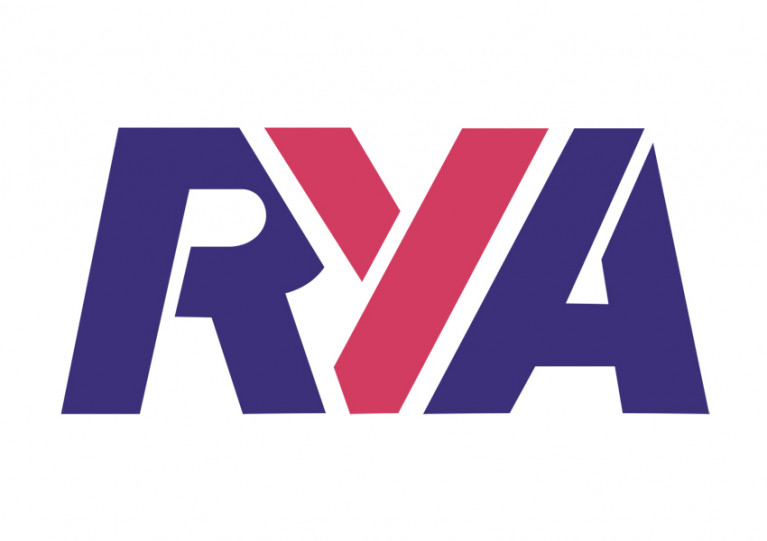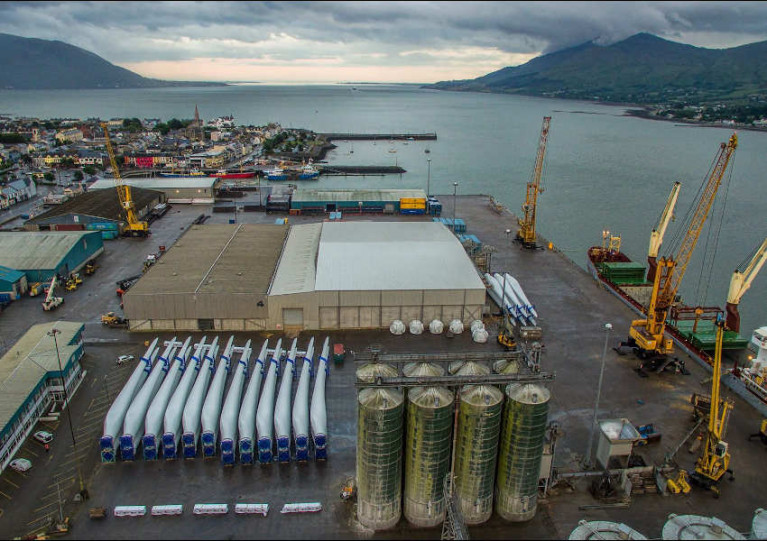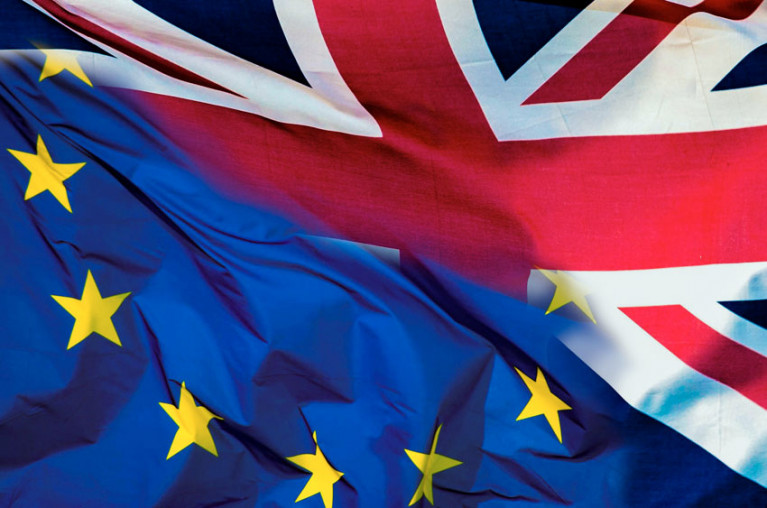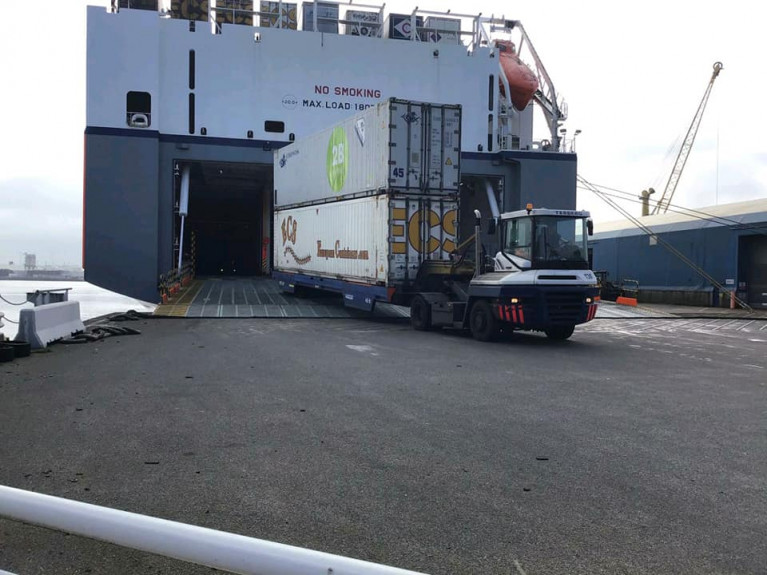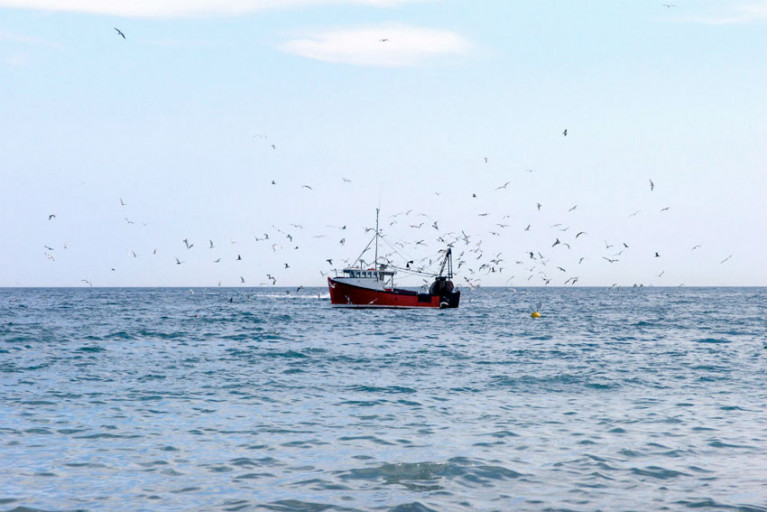Displaying items by tag: Brexit
Irish Fishing Fleets to Lose More Than One Quarter of Western Mackerel Quota Share in Post-Brexit Transfers to UK
Ireland’s fishing fleet stands to lose more than a quarter of the quota of its largest fishery in transfers to the UK under the recent Brexit trade deal.
And the quota share for herring caught in the Irish Sea will be cut by a whopping 96%, according to figures published by the Department of Agriculture, Food and the Marine today, Wednesday 13 January.
In its primary analysis of the reduction of quota shares under the EU/UK Trade and Cooperation Agreement reached last month, the department estimates there will be a 26% reduction in the western mackerel quota share, Ireland’s largest fishery.
In Ireland’s largest non-pelagic fishery — prawns — the Irish quota share reduction will be 14%.
The other whitefish fisheries where there are notable reductions are hake (3% in Celtic Sea), haddock (11% in Celtic Sea, 16 in Irish Sea, 22.6% at Rockall), megrim (8% in Celtic Sea, 19% in West of Scotland), anglerfish/monkfish (7% in Celtic Sea, 20% in West of Scotland) and pollack (8% in Celtic Sea).
Several smaller whitefish quotas in the Donegal/West of Scotland area have seen sizeable quota share reductions, the report states, with the largest part — 60% — between 2020 and 2021.
The aggregate final quota transfer by Ireland after five years (in 2026) is estimated to be €43 million which amounts to a 15% reduction compared to the overall value of the 2020 Irish quotas.
Alongside Germany, this represents the largest transfer as a proportion of quota value among the EU’s maritime states.
The report, which is attached below emphasises that it is based on a preliminary analysis of available data and should be used as a guide only.
Larne Harbour To Get Post-Brexit Facilities for Checks on GB Imports
Larne Harbour is set to get dedicated facilities for post-Brexit checks on imports of food and livestock from Great Britain later this year, as the Belfast Telegraph reports.
Currently a team of 12 environmental health officers are working “24/7, in a 365 role on 12-hour shifts” checking documentation on goods shipping across the Irish Sea border established by UK Prime Minister Boris Johnson’s last-minute trade deal with the EU.
The new infrastructure, expected to be in place by September, will allow for physical checks on food imports as well as live animals such as horses as they arrived into Northern Ireland from other parts of the UK.
Meanwhile, veterinarians in Northern Ireland have been helping businesses fill in the required forms to trade across the Irish Sea.
Speaking to a Stormont Committee, NI’s chief vet Dr Robert Huey said his staff have had to help “overwhelmed” hauliers fill in food standards and customs paperwork to comply with the new regulations.
BBC News has more on the story HERE.
Scottish Patrol Boat Prevents Donegal Trawler Fishing at Rockall
The Department of Foreign Affairs has confirmed it is in contact with UK officials after a Donegal trawler was prevented from fishing around Rockall.
RTÉ News reports on the incident yesterday (Monday 4 January) in which the Greencastle-based Northern Celt was boarded by crew from the Scottish fisheries patrol vessel Jura.
The trawler’s skipper Adrian McClenaghan said he was informed “that we could no longer fish inside the 12-mile limit of Rockall” since the end of the Brexit transition period last Thursday 31 December.
The outcrop in the North Atlantic has been disputed territory for decades. While the UK claims sovereignty, Ireland does not recognise this claim.
As previously reported on Afloat.ie, two Irish experts in maritime law have said Scotland is within its legal rights to assert a 12-mile territorial limit around Rockall as it warned it would do last year.
RTÉ News has more on the story HERE.
Marine Minister Acknowledges Need to Support Fishing Communities to Address Negative Impacts of Brexit Trade Deal
Marine Minister Charlie McConalogue says that the EU Fishing industry will, unfortunately, have to concede some of the fish previously caught in UK waters arising out of the agreement between the EU and the UK on their future relationship.
The Minister has acknowledged the need to support fishing communities to address the negative impacts of the deal. Irish Fishing groups have been quick to deliver their response that now includes a demand for a Mackerel quota transfer as compensation over a ‘Poor’ Brexit trade deal.
Minister Charlie McConalogue says the impact of the deal will be much less than what the UK was demanding throughout, and right up to the end of these negotiations, but he was acutely conscious that these quota reductions will affect important parts of Ireland’s fishing industry. He confirmed that the Government will work hard with the industry to do all it can in supporting and addressing these challenges.
Minister McConalogue added: "I greatly appreciate the input of fishing industry representatives throughout the negotiation process ensuring that Ireland always spoke with one voice. I would like to reassure stakeholders that the Government fully understands their concerns regarding a cut in a number of quota shares, and we will work together with the sector to develop the necessary supports and approach to address these impacts. We will also examine the wider economic impacts on the agri-food and fisheries sectors that will arise, and consider the development of appropriate and targeted supports, including through engagement with the European Commission on the Brexit Adjustment Reserve.”
Irish Fishing Group Demands Mackerel Quota Transfer as Compensation Over ‘Poor’ Brexit Trade Deal
Negotiations on a Brexit trade agreement concluded today (Thursday 24 December) with what European Commission president Ursula von der Leyen described as “a good deal”.
News of the agreement has been generally welcomed across the majority of Irish businesses and representative groups — with the notable exception of the Killybegs Fishermen’s Organisation, which says the deal fails the Irish fishing industry.
And the body is demanding compensation in the form of a transfer of quotas in mackerel — Ireland’s most lucrative catch — from other EU fishing states.
“We cannot stand idly by and allow decades of investment in developing a successful enterprise, to be sacrificed by the shape of this very poor deal,” KFO chief executive Seán O’Donoghue said in a statement.
“In spite of a seismic effort to redress the imbalance of the proposed deal in recent days, not enough has changed and our highly developed mackerel fishery stands to lose out dramatically.
“While the full detail of the text is not yet available, it will require very close examination and analysis. Make no mistake — we will be seeking compensation from our EU colleagues to put right this grievous wrong.
“We won’t accept this. Moreover, we fully expect the Irish Government to deliver the requisite compensation in the form of transfer of mackerel quota from the other EU coastal states which pro rata, have seen a much less severe impact on their respective mackerel fisheries.”
As reported in The Irish Times, Taoiseach Micheál Martin acknowledged that fishing communities would be disappointed by today’s outcome.
“I believe the agreement reached today is the least bad version of Brexit possible, given current circumstances,” he said.
“I know that, more than others, our fishing communities will be disappointed with the outcome. But compared with the prospect of ‘no deal’, which would have seen them completely excluded from British waters, the negotiators have worked to minimise the damage.”
The Irish Times has more on the story HERE.
RYA Round-Up of Brexit Issues for British Recreational Boaters Says Thousands Facing ‘Enormous Financial Disruption’
The RYA has published a new document outlining where British recreational boaters stand post-Brexit — with a deal still not struck eight days before the transition period ends.
In its end-of-year summary, which details what is currently understood about a raft of issues that will affect recreational boaters from 1 January, the RYA estimates that “up to 33,000 British people who go boating in Europe could be affected by Customs and VAT issues which would be applied to them retrospectively”.
It adds: “These are ordinary people who, as UK nationals and residents, have followed the rules and utilised freedoms that were available to them from the UK’s membership of the EU.
The document hits out at “inconsistent advice” from MH Revenue & Customs over the last two years — and says late-arriving clarity meant “insufficient time” for affected boat owners to qualify for Returned Goods Relief (RGR), leaving many liable to “double taxation”.
As previously reported on Afloat.ie, the latest advice from HMRC is for boat owners to carry proof of their vessel’s VAT-paid status at all times — a situation that could be particularly onerous for those who’ve built their own boat.
“At the moment many thousands of British boat owners are facing enormous personal and financial disruption to their lives despite adhering to the law of their country at that time. In many instances, it may even force them to sell their boat,” it states.
The summary also covers Schengen Area rules and new border control regimes both in the UK and the EU’s maritime countries, as well as the changing situation for recognised training centres and instructors working in the EU.
“We have all followed the latest drama of the trade deal negotiations on the daily news recently, but the reality is that sectoral issues have not featured in the high-level discussions involving politicians and negotiators on both sides,” RYA director of external affairs Howard Pridding says.
“That is why the RYA has endeavoured to seek answers from Government officials on the key issues for boaters. As 2020 draws to a close, we have put all that we know together in one document on our website.
“The early months of 2021 are going to deliver uncertainty and many challenges as we enter a post-Brexit era. The RYA Government Affairs Team will be continuing to represent members’ interests and strive to find the clarity that is currently lacking in many areas and we will keep members informed of developments through our website and RYA social media channels.”
Produce arriving into Northern Ireland from Great Britain that fails Brexit checks will be sent back, according to Northern Ireland’s chief veterinary officer.
As the Belfast Telegraph reports, Robert Huey said an alternative option would be to destroy any goods that fail to comply with Irish Sea trading rules under the Northern Ireland Protocol, which is designed to maintain the open border on the island of Ireland.
“They can’t retrospectively provide me with certification or provide me with something else,” he warned traders. “If it’s non-compliant, it goes back.”
NI’s Department of Agriculture, Environment and Rural Affairs (DEARA) has this week published two guides to help people and businesses navigate the new procedures to follow when moving animals, plants, food and feed from GB to NI when the transition period ends.
As previously reported on Afloat.ie, Stormont heard in October that Brexit checks on goods crossing the Irish Sea would be “operationally effectives” from the new year even if customs facilities in port are noted on the ground.
Huey said that a short grace period from 1 January will allow businesses time to adjust to the new rules. But from 31 March, certification will be required for all animal food products.
The Belfast Telegraph has more on the story HERE.
UK boat owners are being encouraged to carry evidence supporting their vessels’ VAT status “at all times” in the latest advice from the British Government.
Marine Industry News reports on the new HM Revenue & Customs notice on ‘sailing your pleasure craft to and from the UK’, which also outlines customs requirements and important tax details for those intending to buy boats post-Brexit.
The new criteria bring much sought-after clarity to the situation of British boaters, resident in the UK and EU alike, who have feared being left in limbo regarding the tax and duty status of their vessels.
As reported on Afloat.ie last month, there were suggestions that, after Christmas, Irish marinas could see an influx of visiting boaters from Northern Ireland eager to secure their status as the transition period ends.
Their situation remains a grey area, however, with the new notice not covering movements between NI and Britain, and stating only that movements between NI and the EU will “continue to be treated as intra-community movements”.
Meanwhile, the new regime could be a particularly difficult one for those who build their own boats — as they would be required to present invoices for all materials used in construction.
Marine Industry News has more on the story HERE.
As Brexit Approaches Shipping Firm to Hire Over 250 Staff
One of Ireland's largest shipping and warehouse companies, Doyle Shipping Group (DSG) is to hire more than 250 staff as the Brexit transition period end nears.
The company according to Independent.ie, has offices and warehouses in many major Irish ports, advertised for traffic management operatives and warehouse operatives.
Both adverts state that the positions have a start date of January 1, 2021, the day after the transition period ends.
Afloat adds the vacancies are for positions of operatives working in Traffic Management and Warehouses.
Fishing rights remain a contentious issue as Brexit talks continue, with Britain lowering its demands on catches by EU fleets — but still far above Brussels’ recent offer.
As previously reported on Afloat.ie, the EU’s chief negotiator Michel Barnier made a proposal to hand back 15-18% of fish caught in UK waters by EU fleets, a figure that could be worth up to €117 million to the British fishing industry.
But as the Guardian reports, Downing Street officials dismissed the offer as “derisory” while revising their demands to 60% from the previous 80%.
Barnier said today (Wednesday 2 December) that progress was being made on a number of key issues, including the UK’s demand for annual negotiations on catches.
Yet he is now under pressure from EU ambassadors not to rush into a deal that would be damaging to Europe’s fishing fleets. Marine Minister Charlie McConalogue stressed to Barnier at the weekend that “Ireland’s fishing industry needs a strong and stable EU/UK Fisheries agreement".
The Guardian has more on the story HERE.

